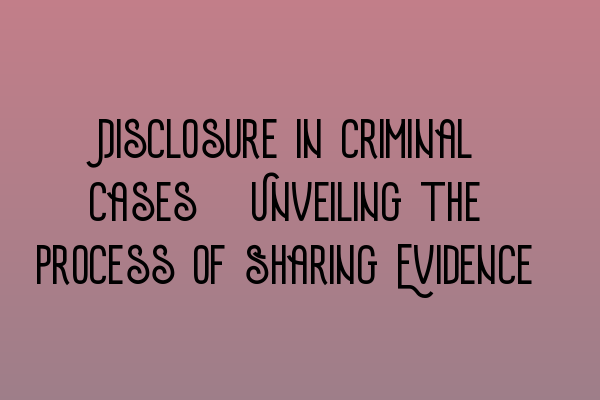Disclosure in Criminal Cases: Unveiling the Process of Sharing Evidence
Disclosure is a crucial aspect of the criminal justice system. It refers to the process of sharing evidence between the prosecution and the defense in a criminal case. The purpose of disclosure is to ensure a fair trial by allowing both sides to examine the evidence and prepare their respective cases. In this blog post, we will delve into the intricacies of disclosure and its importance in criminal cases.
The Legal Framework
Disclosure is governed by the Criminal Procedure and Investigations Act 1996 (CPIA), which sets out the rules and procedures for the disclosure process. The CPIA aims to strike a balance between providing the defense with access to relevant evidence and protecting certain sensitive information from disclosure.
Under the CPIA, the prosecution has a duty to disclose any material that could reasonably be considered relevant to the case. This includes not only evidence that supports the prosecution’s case but also evidence that may undermine it or assist the defense.
The Disclosure Process
The disclosure process typically involves several stages:
- Initial Disclosure: At the start of the case, the prosecution must provide the defense with a summary of the evidence they intend to rely on at trial. This allows the defense to assess the strength of the prosecution’s case and begin preparing their defense strategy.
- Continuing Disclosure: As the case progresses, both the prosecution and the defense have an ongoing duty to disclose any further evidence that comes to light. This includes not only evidence that supports their respective cases but also evidence that may be detrimental to their own case.
- Third-Party Disclosure: In some cases, there may be a need to obtain evidence from third parties, such as witnesses or experts. The prosecution and defense have a duty to ensure that any relevant evidence from third parties is disclosed.
Challenges and Controversies
The disclosure process is not without its challenges. One common concern is the issue of “unused material” – evidence that is not relied upon by the prosecution but may still be relevant to the case. There have been instances where crucial unused material was not disclosed, leading to wrongful convictions and miscarriages of justice.
To address this issue, the CPIA imposes a duty on the prosecution to conduct a “reasonable and diligent” search for unused material and disclose it to the defense. However, determining what constitutes “unused material” and how extensive the search should be can be subjective and open to interpretation.
Conclusion
Disclosure is a fundamental aspect of the criminal justice system. It ensures a fair trial by allowing both the prosecution and the defense access to relevant evidence. However, the disclosure process is not without its challenges, and there have been instances where the failure to disclose crucial evidence has led to serious injustices.
As legal practitioners, it is essential to have a thorough understanding of the disclosure process and stay up-to-date with any developments or changes in the law. For expert legal representation in criminal cases in the UK, contact SQE Criminal Law & Practice Law UK.
Related Articles:
- Legal Representation for Delaware LLCs in the UK: Expert Advice
- Legal Challenges for UK Businesses in the U.S.: Strategies for Overcoming Hurdles
- Legal Challenges for UK Businesses in the U.S.: Strategies for Overcoming Hurdles
- SQE Exam Prep: Essential Study Materials for Aspiring Solicitors
- Expert Testimonies in UK Courts: Building Strong Cases
